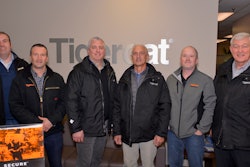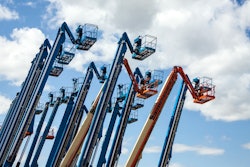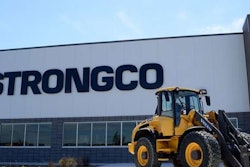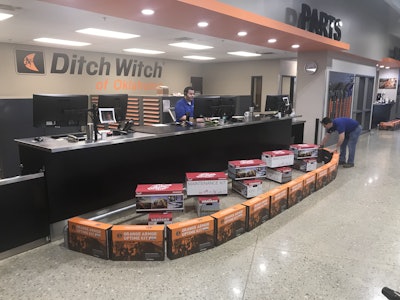 Ditch Witch of Oklahoma used safe distancing to also subtly promote their uptime kits.
Ditch Witch of Oklahoma used safe distancing to also subtly promote their uptime kits.Dealers have two critical constituencies when dealing with the COVID-19 coronavirus: their employees and their customers.
It’s a balancing act as dealers adjust to dealing with what they should and should not do during the virus outbreak.
General Equipment & Supplies techs are sanitizing any shared tools, and sanitizing equipment cabs both before and after any work, says Jon Shilling president and CEO. And there’s no more double teaming on machine repairs for the Komatsu dealer headquartered in Fargo, North Dakota. “Our techs are also staying inside their field trucks if they are not working on a machine,” Shilling says.
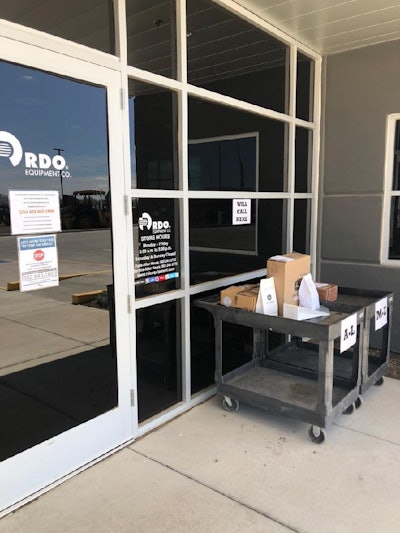 Parts pickup at an RDO branch in Chandler, Arizona.
Parts pickup at an RDO branch in Chandler, Arizona.“We’re really pushing minimal contact in our parts and service fulfillment,” says Lindsay Paulson with RDO Equipment, a Deere and Vermeer dealer with 75-plus locations in nine states . “We’re emphasizing online ordering, curbside drop offs, drop boxes, all of the different options we have.”
Stores have set up 6-foot social distance areas around their customer service counters. Ditch Witch locations in the Orange Power Group have delineated the social distance line with displays of Ditch Witch Orange Armor uptime kits, says Gary Bridwell, president. His company also did a deep fog germicide cleaning of its headquarters building last week.
RDO sales reps are being encouraged to do everything over the phone, Paulson says. Many dealers, including RDO, have put information up on their websites to explain their pandemic procedures.
Taking care of employees
“There’s no question as to what my No. 1 responsibility is,” Bridwell says. “It’s maintaining the health and welfare of my employees.” The Orange Power Group includes Ditch Witch of Oklahoma & Arkansas and Ditch Witch of the Rockies.
Bridwell’s insurance company is waiving the co-pay on employee use of the MDlive app, which describes itself as a “virtual doctor visit,” where employees can describe their symptoms and receive prescriptions over a website or mobile device. “We’ve encouraged all of our employees to sign up,” he says.
Franklin Equipment, headquartered in Groveport, Ohio, is daily monitoring employee temperatures, a request made by Ohio Gov. Mike DeWine for all Ohio businesses. “At first we couldn’t find thermometers because everyone was searching for them, but one of our locations was able to ship temple thermometers to us,” says Breanne Muncy, marketing manager.
Alta Equipment has created a COVID-19 task force and is conducting daily briefings, says Scott Sebastian, director of marketing and business development for the Volvo dealer, which has 43 locations across Michigan, Illinois, New England, New York and Florida. “This is all so new and we have to stay engaged with our employees and partners,” he says. “We’re open for business but will continue to be a good steward in adhering to CDC and local guidelines.”
“When we left last Friday, we urged our employees to make smart decisions over the weekend, because their actions could dictate how long we keep open,” Bridwell says. “Checking back in on Monday, we felt they were trying to do that.”
Taking care of customers
“Our message has been clear with customers,” Sebastian says. “We’re here to support them. We can provide assistance so they can stay working, through service, parts or rental. It’s new territory for everyone and we will work to help them.”
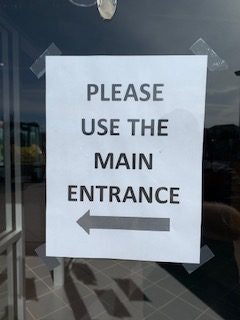 Sign at Franklin Equipment entrance directing visitors to use one door.
Sign at Franklin Equipment entrance directing visitors to use one door.“Our rental counters are our biggest hub, and we’re continually cleaning them.” says Muncy. “Our show rooms are still open, but we’ve reduced the number of entrances down to one instead of five so that we can keep in sanitized.”
RDO’s COVID-19 page says it also will offer video conferencing for parts and service questions. RDO team members are only visiting customers if if they want to drop off parts, deliver equipment or demo machines — all while practicing safe social distancing. “Demos are a little more challenging with the distance but we’re still providing them as customers need,” says Paulson.
Group think
Dealers are using their OEM dealer groups and the Associated Equipment Distributors to get some group think on the situation. For instance, Bridwell is keeping touch with Ditch Witch dealers in the western half of the U.S. to discover best practices.
And Shilling is part of the AED 20 Group, a peer group of dealer principals. “Our talk right now is less on the financial side and more on best practices for dealing with the virus,” he says.
“We feel equipment dealers are essential to keeping the economy running,” said Michael Airdo, attorney with Kopon Airdo in an AED “Are Equipment Dealers Essential?” webinar earlier this week. But he urged listeners to maintain safe practices. “Don’t be the reason why a governmental entity issues a more restrictive order,” he told dealers.
Different states, different experiences
Many dealers today have locations in multiple states, which adds several wrinkles. What’s happening in one state may seem distant to employees in other states. The situation also changes daily, if not hourly. Mission critical is communication to both employees – including best practices and reassurances – and customers – safety processes, open hours, and yes, reassurances.
“When the first wave of impact hit, some of our locations were not feeling it as much as we did in our headquarters in Ohio, so we had to explain our reasoning behind our actions more,” says Muncy. Franklin Equipment has 20 locations in Wisconsin, Indiana, Ohio, Kentucky, Tennessee, Georgia and South Carolina.
General Equipment, which has operations in four states, also has an additional complication: One of its locations is in Canada. “So we need to keep abreast of what’s going on in both countries,” Shilling says.
(Equipment World reached out to several dealers in Pennsylvania, where the governor shut down all but health-related construction work, and in New York, which is now the at the center of the U.S. pandemic. We’ll update information as responses come in, and welcome dealers in any region to contact us about how they are dealing with the virus.)
How long?
Hovering in the back of everyone’s minds is “how long?”
If their customers can’t work, it’s hard for dealers to work. “We’re hearing that customers can’t get utility locates and several telecommunication companies have shut down,” Bridwell says. “Our walk-in business has decreased, but it looks like we’re still going to have a decent month.”
The how-long question has particular resonance in construction since contractors in the northern states shift into high gear in the coming weeks.
“We had 700 customers at our ConExpo event, and they had worked lined up,” says Shilling. “Business is still going but it is slower than normal. But then we really haven’t kicked into the construction season yet up here.”
“People are still digging and building,” says Sebastian. “Construction is still considered an essential business in Michigan, which allows our employees to continue to support it.”
“Some larger jobsites have shut down but the smaller contractors are still working and they are our bread and butter,” Muncy says. “The main question we get from contractors is whether or not we’re still open, and yes, we are.”


